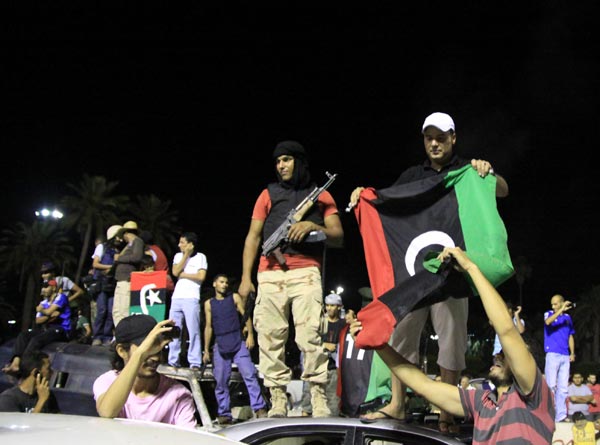Rebels consolidate grips on Tripoli, lives miserable for locals
 0 Comment(s)
0 Comment(s) Print
Print E-mail
Xinhua, August 28, 2011
E-mail
Xinhua, August 28, 2011
As rebel forces were still struggling to clean up Muammar Gaddafi's loyalists after they seized most part of the capital Tripoli Saturday, local residents were feeling more keenly the aftermath of the week-long fighting to topple Gaddafi's regime.
|
|
|
Libyan citizens celebrate in Tripoli, Libya, Aug. 27, 2011. Head of National Transitional Council (NTC) Mostafa Abdel Jalil on Saturday vowed fair trials for those worked with fallen leader Mummar Gaddafi. [Xinhua] |
Rebels said Saturday they had taken complete control over Tripili airport, but the airport was still being targeted by sporatic shooting and shelling. The situation in the capital remained volatile with bursts of heavy machine gunfire and explosions heard throughout the night.
More and more bodies were found in the capital. Some were Gaddafi soldiers, while others seemed to be victims of earlier execution.
Britain's Sky News reported Saturday the charred remains of around 53 people had been found in a warehouse in Tripoli, apparently opponents of Gaddafi who were excuted as his rule collapsed.
Reports of the cold-blooded killings by both sides in the past few days have dampened the festivity of the city where many had celebrated for Gaddafi's fall.
The National Transitional Council (NTC) and the Western countries that backed rebel forces with five-month airstrikes are aware of the need to prevent Libya collapsing into the chaos that plagued Iraq for years after the U.S.-led invasion of 2003.
Meanwhile, the whereabouts of Gaddafi remained a mystery. The Algerian Foreign Ministry denied an Egyptian news agency report that a convoy of six armored cars that could be carrying high-profile Libyan officials, even Gaddafi himself, crossed from Libya into Algeria on Friday.
NTC head Mustafa Abdel Jalil said rebel commanders were negotiating with Gaddafi loyalists to try to persuade them to surrender control over Gaddafi's hometown of Sirte, 450 km east of Tripoli.
Libya is in fact cut in two by pro-Gaddafi forces holding territory stretching southward from Sirte, deep into the desert.
Far to the west, after fighting with pro-Gaddafi forces Friday, rebels controlled Ras Jdir, the main border with Tunisia and a lifeline for food, fuel and medical supplies for Tripoli.
In Tripoli, life remained far from normal for 2 million local residents.Electricity was cut for several hours a day. Many districts had no water and the price of food and petrol has skyrocketed.
NTC spokesman Mahmud Shammam said Saturday in Tripoli the rebels would start distributing 30,000 tons of petrol to residents immediately, and would provide cooking gas within the next 48 hours.
Shammam said they were also working to restore the Zawiyah refinery. "We are starting from the point zero in this situation. Do not ask for miracles, but we promise to try to make this difficult period as short as we can."
Jalil said food and other daily necessaties were urgently needed in Tripoli and he urged the international community to provide humanitarian aid including medicines and surgical instruments.
The British government said Saturday it would provide 4.9 million U.S. dollar-worth emergency humanitarian aid to Libya including medicines and food as well as medical teams.
The International Organization for Migration said in a statement that a first ship carrying 263 people, mostly Egyptian and Algerian evacuees from Tripoli, arrived in the eastern Libyan city of Benghazi on Saturday. The group said it would send more in the coming days.







Go to Forum >>0 Comment(s)